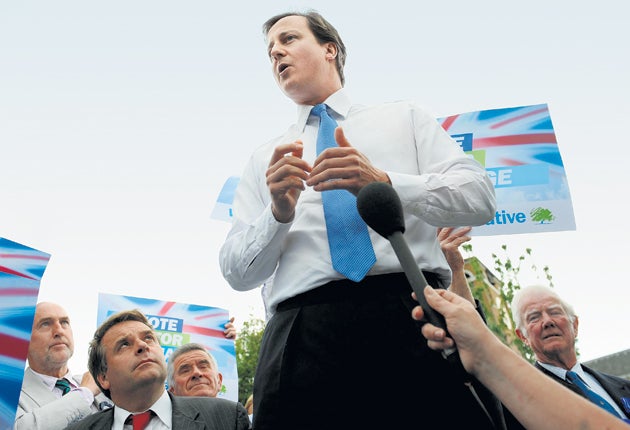Tories seize control of six councils but vote hit by expenses backlash

The Conservatives were the undisputed winners of the local election results, wresting several councils from Labour and Liberal Democrat control. But their celebrations were muted as the party only picked up an estimated 38 per cent of the vote – below the proportion it would need for a convincing victory at the next general election.
David Cameron's party will now anxiously wait to see the level of its support in the face of a challenge by the UK Independence Party in the European election results being declared tomorrow.
The Tories seized control of Derbyshire, Lancashire and Staffordshire from Labour after a haemorrhage in support for the Government and were on course last night to win Nottinghamshire. The party has not run any of the three councils for nearly three decades. They were particularly heartened by the success in Lancashire, where they captured 21 seats from Labour, because there are 10 marginal parliamentary seats in the county. The success in Derbyshire – once regarded as a bastion of left-wing socialist rule – was also remarkable.
The Conservatives took control of North Tyneside council after their candidate was elected Mayor. The party also evicted the Liberal Democrats from power in their Devon and Somerset heartlands and won 54 of the 66 seats in the new unitary council of Central Bedfordshire.
The party said the victories in the North, Midlands and the South-west proved its appeal was spreading to all parts of England. Mr Cameron said: "You can see the Conservative Party strong, united and positive, winning in every part of our country. Across the country what's remarkable about these figures and what shines out is it's the Conservative Party winning in every part of the country."
Last night, a BBC projection put the Tories on 38 per cent of the vote, six points down since last year. The Liberal Democrats were up three to 28 per cent and Labour on 23 per cent, a further drop of one point on a historic low last year. The other parties attracted 11 per cent support, a rise of four points, and suggesting all the main parties faced a backlash from the Commons expenses scandal. However, the British National Party (BNP) only made a modest breakthrough yesterday.
Repeated in a general election, the figures would translate into a narrow overall Commons majority of about 20 for David Cameron – barely enough to guarantee five years of stable government. Tory strategists insisted they were happy with the performance, arguing they had still achieved a nine-point swing from Labour and were polling strongly in target areas. The strong support in the key battlegrounds suggests the tactic masterminded by Lord Ashcroft, its deputy chairman, of pouring resources into marginal seats is paying off. They also pointed out that Labour "lost" the 2004 local elections and went on to win the general election the following year under Tony Blair. They acknowledged, however, that the Commons expenses scandal had some impact on their support with some voters declaring a "plague on all your houses".
Despite their setbacks in the South-west, the Liberal Democrats declared themselves satisfied that they had consolidated their position as the second party in local government. Their biggest success was in Bristol where they took control of the city council after Labour lost eight seats – four to the Liberal Democrats and four to the Tories.
The Liberal Democrats already control three other major cities – Liverpool, Newcastle and Sheffield – and are in power-sharing coalitions in Leeds and Birmingham. Nick Clegg, the Liberal Democrat leader, hailed the beginning of a "complete transformation of city politics" as his party defeated Labour in its former urban strongholds.
The BNP gained its first county councillors, winning its Burnley stronghold in Lancashire, as well as seats in Leicestershire and Hertfordshire. But it failed to pick up any in Cumbria where it mounted a concerted drive for votes before polling day.
The English Democrats, who campaign for an English parliament, scored a surprise victory in the elections to become Mayor of Doncaster.
Subscribe to Independent Premium to bookmark this article
Want to bookmark your favourite articles and stories to read or reference later? Start your Independent Premium subscription today.

Join our commenting forum
Join thought-provoking conversations, follow other Independent readers and see their replies